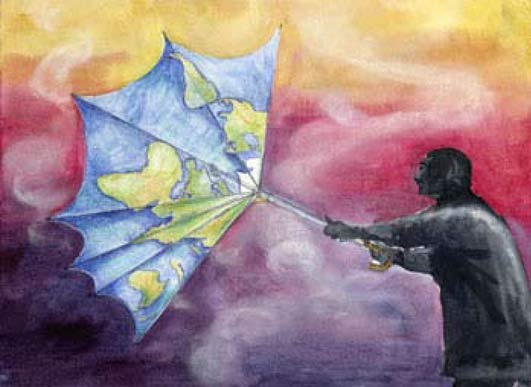 (Illustration: Artwork from the UN’s International Children’s Painting Competition, found here).
(Illustration: Artwork from the UN’s International Children’s Painting Competition, found here).
Raindrops and gray — a wet-touch with color for this early-evening Sunday here on California’s north coast, the air all day clipped by some way-brisk wind — reportedly, should be sunny tomorrow, at least that’s what WunderBlog forecasts. More rain supposedly on Tuesday, followed by sunshine Wednesday and Thursday, then a return to some rain by Friday, and forward into next weekend.
The NWS generally concurs, though, they forecast maybe a ‘chance of rain‘ for Wednesday.
Is this a mini-version kind of ‘whiplash events,’ a climate-change situation as noted by research published earlier this year? Rain/sun/rain/sun, so forth, but on a larger scale as in extreme wet/dry future. From the study’s Abstract: ‘As a consequence, a 25-percent to 100-percent increase in extreme dry-to-wet precipitation events is projected, despite only modest changes in mean precipitation. Such hydrological cycle intensification would seriously challenge California’s existing water storage, conveyance and flood control infrastructure.’
And all depends/hinges on a most-frighting question — will humanity gain a handle on climate change before it’s too late?
In an article on the study, written by Kate Wheeling and published last April at Pacific Standard — I was in the hospital then, wasn’t paying attention — painted a not-fun scenario for California, and the world in general. Still resonates near-nine months later, especially potent, the story’s last graph:
The good news is the worst impacts could still be averted — provided big emitters around the world, including the United States, get it together to drastically reduce carbon emissions, which maybe makes it not such good news after all.
Fast-forward to today, and the last few days in the ordeal to get climate change on the world’s docket. The French are feeling the blunt of what’s ahead — via Skeptical Science‘s story of the week:
Just a few months before protests exploded across France, the country’s senate was warned the shift to a clean economy risked social disruption, according the scientist who presented the evidence.
Valérie Masson-Delmotte, a French climate scientist and co-chair of the Intergovernmental Panel on Climate Change (IPCC), told Climate Home News’ podcast CopCast that members of the senate committee of sustainable development had been “surprised” by findings in a major report in October, which said green policies must be coupled with public consultation or face social resistance.
“They expressed how difficult it is for them as members of the senate to think on how to implement transitions. They also said they were powerless. They didn’t know how to change things, basically,” said Masson-Delmotte.
An obstacle in fighting climate change at this stage — shit’s got to be drastic, but people ain’t gonna like it.
Yet there’s even worse shit at the climate-change conference in Poland — via the BBC:
The report said that the world is now completely off track, heading more towards 3C this century rather than 1.5C.
Keeping to the preferred target would need “rapid, far-reaching and unprecedented changes in all aspects of society”.
If warming was to be kept to 1.5C this century, then emissions of carbon dioxide would have to be reduced by 45-percent by 2030.
The report, launched in Incheon in South Korea, had an immediate impact winning praise from politicians all over the world.
But negotiators here ran into serious trouble when Saudi Arabia, the US, Russia and Kuwait objected to the conference “welcoming” the document.
Instead they wanted to support a much more lukewarm phrase, that the conference would “take note” of the report.
…
“We are really angry and find it atrocious that some countries dismiss the messages and the consequences that we are facing, by not accepting what is unequivocal and not acting upon it,” said Yamide Dagnet from the World Resources Institute, and a former climate negotiator for the UK.
…
Many delegates are now hoping that ministers, who arrive on Monday, will try and revive efforts to put this key report at the heart of the conference.
“We hope that the rest of the world will rally and we get a decisive response to the report,” said Yamide Dagnet.
“I sincerely hope that all countries will fight that we don’t leave COP24 having missed a moment of history.”
Understatement shit there…
According to NASA: ‘The difference between weather and climate is a measure of time. Weather is what conditions of the atmosphere are over a short period of time, and climate is how the atmosphere “behaves” over relatively long periods of time.’
Climate is getting warmer, but global warming isn’t the only problem — from PBS this afternoon:
Salts that de-ice roads, parking lots and sidewalks keep people safe in winter.
But new research shows they are contributing to a sharp and widely rising problem across the U.S.
At least a third of the rivers and streams in the country have gotten saltier in the past 25 years.
And by 2100, more than half of them may contain at least 50 percent more salt than they used to.
Increasing salinity will not just affect freshwater plants and animals but human lives as well—notably, by affecting drinking water.
Just sayin’…